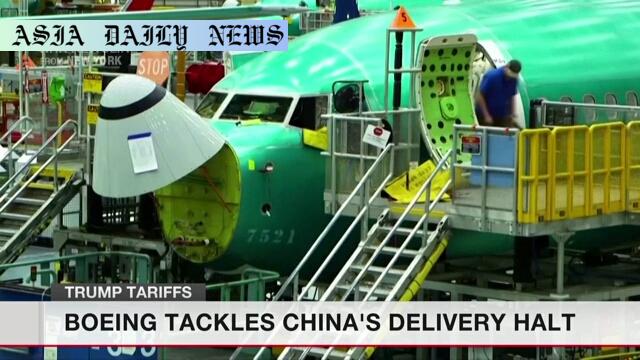Boeing tackles China’s delivery suspension amid tariff tensions, striving to stabilize operations while addressing US-China challenges.
- Boeing reported a 17% rise in revenue to $19.4 billion during Q1.
- China’s tariff issues halted Boeing plane deliveries, creating headwinds.
- Boeing is redirecting its supply to meet stable global demand.
- CEO Kelly Ortberg emphasizes the company’s efforts to sustain stability amid challenges.

Strong Financial Performance Despite Mounting Challenges
The aviation giant Boeing has seen a remarkable 17% rise in revenue during the first quarter of 2023, marking the company’s resilience and operational excellence amidst a volatile economic landscape. With $19.4 billion in revenue and an increase in delivered aircraft from 47 to 130, Boeing demonstrated its capacity to recover from prior production setbacks and post-pandemic challenges.
However, while these financial gains highlight the company’s commitment to fulfilling customer obligations, new obstacles tied to geopolitical conflicts have emerged. A primary concern relates to halted deliveries to Chinese airline customers in light of tariff disputes between the US and China. This unexpected development threatens Boeing’s short-term growth trajectory despite the relative stability it has displayed in other global markets.
Impact of Trade Tariffs on Boeing’s China Strategy
China, previously one of Boeing’s largest aircraft buyers, paused the acceptance of new deliveries due to rising trade tensions and economic restrictions implemented by the Chinese government. The move disrupted Boeing’s planned delivery schedule of approximately 50 aircraft for 2023 to customers in this critical region, creating a ripple effect throughout its global supply chain.
CEO Kelly Ortberg expressed the company’s intention of taking a “straightforward approach” to resolving these difficulties. He emphasized redirecting aircraft intended for China to markets experiencing stable demand and emphasized that Boeing would not continue to manufacture products for clients that are unable to accept delivery. This announcement underscores a strategic pivot by the company to ensure resources are utilized efficiently amidst uncertainty in its Chinese operations.
Proactive Engagement with US Policymakers
To address these headwinds, Boeing has engaged proactively with policymakers in the United States, given its position as a top US exporter and a significant contributor to the national economy. Ortberg reaffirmed that the Trump administration understands Boeing’s pivotal role in the aerospace industry, implying potential collaboration and government support to mitigate the economic consequences of the tariff disputes.
The aerospace industry is a cornerstone of US manufacturing, and its stability is imperative for sustaining economic growth. Boeing continues to advocate for a resolution in trade conflicts that ensures mutual benefits between the US and its partners, particularly China.
Looking Forward: Pathways to Stabilization
Despite the current obstacles, Boeing remains optimistic about its ability to stabilize operations. Redirecting supply to cater to other global demand offers an opportunity to bolster performance outside of China. At the same time, efforts to resolve the trade disputes at a diplomatic level leave room for eventual re-engagement with Chinese buyers, albeit under redefined conditions.
As Boeing leans into its historically robust market presence and operational adaptability, the company’s future pivots on its ability to persevere through geopolitical turbulence while maintaining commitments to shareholders and customers worldwide.



Commentary
Understanding the Broader Impacts of Tariff Tensions
The challenges Boeing faces due to the halted deliveries in China underscore the increasingly globalized and interconnected nature of industries like aerospace. Boeing’s link to Chinese markets isn’t just about selling planes—it’s a testament to decades of symbiotic relationships that fostered mutual economic growth. With heightened tensions, both governments risk undermining these benefits.
For Boeing, the timing is critical. After recovering from pandemic-related downturns, this disruption could jeopardize its path to profitability just as it regains momentum. While the company’s pivot to alternative markets may offset some financial strain, the loss of a key customer like China highlights the broader consequences of unresolved geopolitical disputes.
Boeing’s Pragmatism in an Unstable Landscape
One cannot help but appreciate Boeing’s proactive efforts to adapt. Redefining delivery plans and engaging multilaterally showcase its determination to overcome hurdles. However, this also raises key questions about sustainability. How many alternative markets can reasonably absorb redirected supplies? And at what point do geopolitical entanglements begin to outweigh strategic business decisions?
The company’s collaboration with US policymakers is insightful; leveraging its status as a leading exporter may help create leverage in resolving trade conflicts favorably. However, the long-term solution must involve fostering globally cooperative frameworks that recognize aerospace as a unifying rather than dividing sector.
The Role of Leadership and Resilience
CEO Kelly Ortberg’s leadership is pivotal during these uncertain times. His realistic and straightforward strategies signal a willingness to take calculated risks while ensuring Boeing adapts to an unpredictable economic climate. This resilience sets an example for industries similarly grappling with global supply chain disruptions and geopolitical hazards.
In conclusion, Boeing’s ability to convert challenges into opportunities will likely determine its trajectory over the coming years. The company’s focus on stabilization and resourcefulness is commendable, although decisive resolutions on international trade policies remain vital for long-term success.